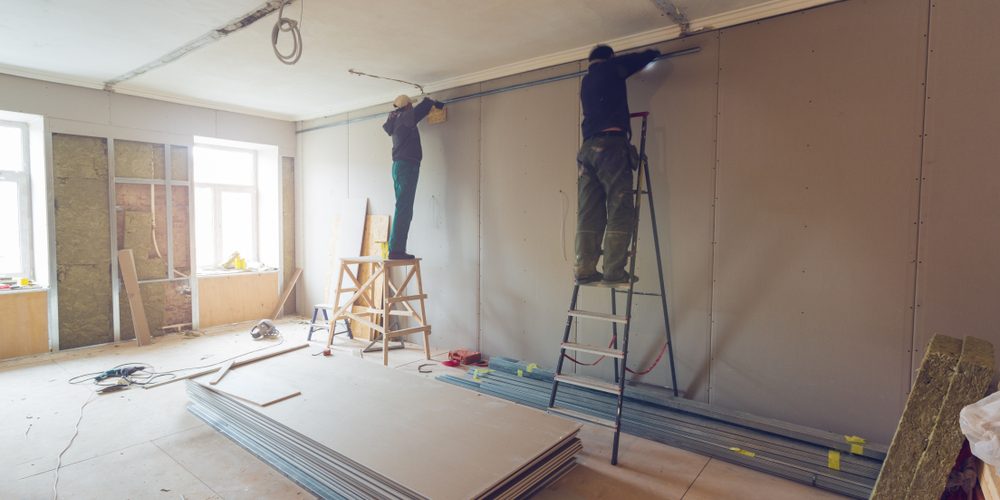Owning a home is a joy, but it also comes with its fair share of maintenance tasks. Drywall, the ubiquitous wall material found in most modern homes, is no exception. Over time, drywall can develop cracks, holes, and other imperfections that can detract from your home’s aesthetics and functionality. While some repairs may seem daunting, many common drywall issues can be addressed with a little DIY know-how and the right tools.
This blog post equips Allen, TX homeowners with the knowledge and confidence to tackle simple drywall repairs. We’ll explore common issues, provide step-by-step solutions, and offer valuable tips for achieving a smooth and professional-looking finish.
Identifying Common Drywall Issues
The first step to fixing a drywall problem is accurately identifying it. Here’s a breakdown of some common drywall issues you might encounter:
Nail Pops:
These small bumps occur when the nails used to secure drywall panels loosen over time. They’re a common occurrence, especially in new construction as the house settles.
Stress Cracks:
Hairline cracks can appear on drywall due to normal house movement, temperature fluctuations, or improper installation. While typically not a major structural concern, they can be unsightly.
Small Holes:
Small holes can be caused by anything from picture hangers to doorknobs. The severity of the repair depends on the size and depth of the hole.
Larger Holes:
Larger holes, caused by accidents or plumbing issues, require a more comprehensive patching process.
DIY Drywall Repair Essentials
Before diving into repairs, ensure you have the necessary tools and materials:
- Safety Glasses: Protect your eyes from dust and debris.
- Respirator: Wear a respirator when sanding drywall dust, which can be harmful if inhaled.
- Utility Knife: For cutting drywall patches and joint compound.
- Putty Knife: Used to apply and smooth joint compound.
- Sandpaper (Various Grits): For smoothing out patched areas and prepping for paint.
- Joint Compound (Drywall Mud): The patching material that fills holes and imperfections.
- Mesh Patch (for larger holes): Reinforces larger repairs.
- Caulking Gun (optional): For filling small gaps around the repair area.
Patching Up Nail Pops and Small Holes
Here’s a step-by-step guide to fixing nail pops and small holes:
- Locate the Fastener: Use a hammer to gently tap the protruding nail head back into the drywall.
- Apply Joint Compound: Use a putty knife to spread a thin layer of joint compound over the nail hole or small indentation.
- Smooth the Patch: Once the compound dries slightly, use fine-grit sandpaper to smooth out the patched area.
- Repeat and Sand: Apply additional thin layers of joint compound as needed until the patch is flush with the wall surface. Sand between each coat for a smooth finish.
- Prime and Paint: Once the final coat of the joint compound is dry and sanded, prime the repaired area before applying paint that matches your existing wall color.
Tackling Larger Holes and Stress Cracks
While the previous section addressed minor imperfections, larger holes, and stress cracks require a slightly more involved approach. Here’s what you’ll need to know:
Larger Holes:
- Cut a Patch: Using a utility knife and a straightedge cut a square or rectangular patch of drywall slightly larger than the hole.
- Sharpen the Patch Edges: Score a thin line along the backside of the drywall patch about an inch from the edges. This allows the paper to fold and create a smooth transition when applied to the wall.
- Apply Mesh Patch (Optional): For larger holes exceeding a few inches, consider using a fiberglass mesh patch behind the drywall patch for added reinforcement.
- Spread Joint Compound: Apply a generous amount of joint compound to the back of the drywall patch and the surrounding wall area.
- Press and Smooth: Carefully press the patch into the hole, ensuring it sits flush with the wall surface. Use a putty knife to smooth out any excess joint compound around the edges.
- Building Up Layers: Similar to patching nail pops, apply multiple thin layers of joint compound over the patch area, allowing each layer to dry completely before sanding. Sand between coats for a seamless finish.
- Prime and Paint: Once the final coat of the joint compound is dry and sanded smooth, prime the repaired area and repaint to match the surrounding wall.
Stress Cracks:
- Surface Preparation: Use a utility knife to widen the hairline crack slightly, creating a V-shaped groove. This ensures better adhesion for the joint compound.
- Apply Joint Compound: Fill the widened crack with a thin layer of joint compound using a putty knife.
- Cover with Paper Tape (Optional): For larger stress cracks, consider applying a thin layer of self-adhesive mesh drywall tape over the filled crack for added reinforcement.
- Layer and Sand: Apply multiple thin coats of joint compound over the crack, letting each layer dry completely before sanding. Sand between coats for a smooth finish.
- Prime and Paint: Once the final coat of the joint compound is dry and sanded smooth, prime the repaired area and repaint to match the surrounding wall.
While these DIY tips can address some larger holes and stress crack repairs, complex situations or extensive damage are best left to drywall professionals. Their experience and advanced techniques ensure a long-lasting and professional-looking repair.
FAQS
Q1. Can I repair the drywall myself?
For minor repairs like nail pops and small holes, with the proper tools and these DIY tips, you can certainly tackle them yourself. However, for larger holes, extensive stress cracks, or situations where you lack confidence, consulting a drywall professional is recommended.
Q2. How much does it cost to fix a hole in the drywall?
The cost of drywall repair depends on the size and complexity of the damage. Minor repairs can range from $20 to $50, while larger repairs or those requiring patching can cost upwards of $100 or more.
Q3. What kind of spackle should I use for drywall repair?
The term “spackle” is sometimes used interchangeably with joint compound. However, joint compound is generally preferred for drywall repairs due to its superior strength and durability.
The Impact of Proper Drywall Repair
Ignoring minor drywall issues can lead to bigger problems down the road. Left unaddressed, small cracks can worsen, and holes can become vulnerable to moisture and drafts. Prompt repair not only restores the aesthetic appeal of your walls but also maintains the structural integrity of your home.
DIY vs. Professional Drywall Repair
While DIY repairs can be a cost-effective solution for minor drywall issues, there are significant advantages to partnering with a professional drywall contractor in Allen, TX like MJ Workforce Solutions for larger or more complex repairs.
- Expertise and Experience: Professional drywall contractors possess the knowledge and experience to handle any repair efficiently and ensure a long-lasting, flawless finish.
- Quality Materials: Professionals use high-quality joint compounds and finishing techniques that guarantee a durable and professional-looking repair.
- Efficiency and Safety: Drywall contractors work quickly and efficiently, minimizing disruption to your daily routine. They also prioritize safety measures like dust control to protect your health and property.
Seeking Expert Advice for Drywall Repair in Allen, TX
If you’re facing drywall damage in your Allen, TX home, don’t hesitate to seek expert advice. While this blog post has equipped you with valuable DIY tips for tackling minor repairs, there are situations where professional intervention is the best course of action.
Here are some signs that indicate it’s time to call a drywall contractor:
- Extensive Damage: Large holes, significant water damage, or widespread cracks require a professional approach to ensure a structurally sound and aesthetically pleasing repair.
- Complex Repairs: Repairs involving electrical wiring, plumbing lines, or uneven surfaces often necessitate the expertise of a qualified drywall contractor.
- Lack of Confidence: If you lack the confidence or experience to tackle the repair yourself, don’t hesitate to reach out to a professional for peace of mind and a guaranteed quality outcome.
The Benefits of Partnering with MJ Workforce Solutions
At MJ Workforce Solutions, we understand the importance of maintaining a beautiful and functional home. Our team of experienced drywall repair specialists in Allen, TX is dedicated to providing exceptional drywall installation service and top-quality workmanship. Here’s what you can expect when you choose us:
- Free Consultation and Estimate: We offer a free consultation to assess the damage and provide a detailed estimate outlining the scope of work and cost.
- Efficient and Meticulous Repairs: Our team works quickly and efficiently to minimize disruption to your daily routine while maintaining meticulous attention to detail for a flawless finish.
- Safety and Cleanliness: We prioritize safety measures like dust control and proper cleanup to protect your health and property.
- High-Quality Materials and Techniques: We use only the best materials and employ proven techniques to ensure long-lasting and professional repair.
- Guaranteed Satisfaction: We stand behind our work and offer a guarantee on our drywall repairs for your peace of mind.
Don’t let drywall damage diminish the beauty and value of your Allen, TX home. Contact MJ Workforce Solutions today for a free consultation and experience the difference that professional drywall repair can make!







